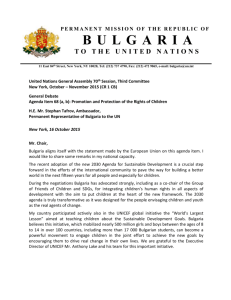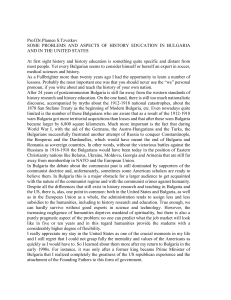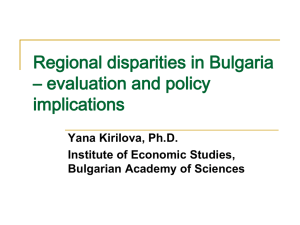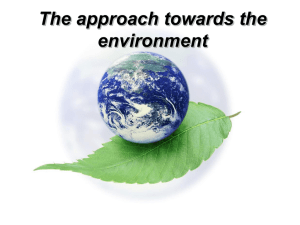ANNOTATED BIBLIOGRAPHY
advertisement
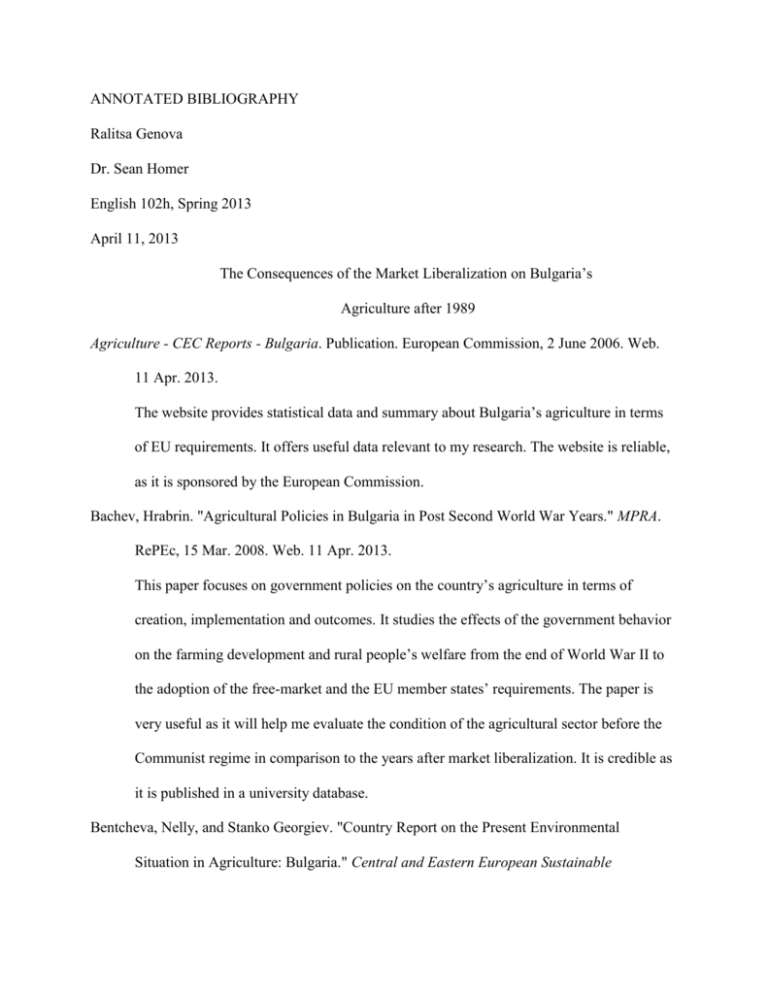
ANNOTATED BIBLIOGRAPHY Ralitsa Genova Dr. Sean Homer English 102h, Spring 2013 April 11, 2013 The Consequences of the Market Liberalization on Bulgaria’s Agriculture after 1989 Agriculture - CEC Reports - Bulgaria. Publication. European Commission, 2 June 2006. Web. 11 Apr. 2013. The website provides statistical data and summary about Bulgaria’s agriculture in terms of EU requirements. It offers useful data relevant to my research. The website is reliable, as it is sponsored by the European Commission. Bachev, Hrabrin. "Agricultural Policies in Bulgaria in Post Second World War Years." MPRA. RePEc, 15 Mar. 2008. Web. 11 Apr. 2013. This paper focuses on government policies on the country’s agriculture in terms of creation, implementation and outcomes. It studies the effects of the government behavior on the farming development and rural people’s welfare from the end of World War II to the adoption of the free-market and the EU member states’ requirements. The paper is very useful as it will help me evaluate the condition of the agricultural sector before the Communist regime in comparison to the years after market liberalization. It is credible as it is published in a university database. Bentcheva, Nelly, and Stanko Georgiev. "Country Report on the Present Environmental Situation in Agriculture: Bulgaria." Central and Eastern European Sustainable Agriculture Network: First Workshop : Proceedings : Gödöllő, Hungary, 2 to 7 March 1999. Rome: Food and Agriculture Organization of the United Nations, 1999. N. pag. REU Technical Ser. FAO. United Nations. Web. 10 Apr. 2013. This report discusses the impacts on environment from the changes in the country’s agriculture due to the transition to an open-market economy. It studies the course of reforms in relation to environmental conditions and proposes protective measures. From this report I will gain a useful overview for the environment situation for the time period. The report seems credible, as it was written for a UN organization. Brooks, Karen, J. Luis Guasch, Avishay Braverman, and Csaba Csaki. "Agriculture and the Transition to the Market." The Journal of Economic Perspectives 5.4 (1991): 149-61. JSTOR. American Economic Association. Web. 10 Apr. 2013. This article studies the challenges transition economies in Central and Eastern Europe face in their agricultural sectors. The author focuses on the need for appropriate adjustment measures regarding privatization and land ownership. It also draws attention to the consequences on farmers and land-owners. The article offers some useful detailed information about Bulgaria. It is credible as it is written by renowned academics. Creed, Gerald W. "Agriculture and the Domestication of Industry in Rural Bulgaria." American Ethnologist 22.3 (1995): 528-48. JSTOR. Wiley-Blackwell. Web. 10 Apr. 2013. The article examines the characteristics and performance of Bulgarian agriculture during socialism and the challenges caused by the transition. By giving as an example the country’s industry domestication in the sector the author argues that needs of the industry not necessarily define agriculture, and that our premise of the superiority of capitalism is therefore, tested. This article is relevant to my research topic, hence it will be helpful. The journal is peer-reviewed, found in an academic database. Checking its references will also be of a good use. Csáki, Csaba. Food and Agriculture in Bulgaria: The Challenge of Preparing for EU Accession. Washington, DC: World Bank, 2000. Print. The report studies the situation of agriculture and agro-industry of Bulgaria. It reviews the economic results of the implemented policies in the sector and suggests possible successful actions for the completion of CAP requirements of EU. This report is relevant to my topic. In addition to the information of the agricultural condition, I may find useful statistical data. The publisher is the World Bank, therefore, I consider the report to be reliable. Dudwick, Nora. Land Reform and Farm Restructuring in Transition Countries: The Experience of Bulgaria, Moldova, Azerbaijan, and Kazakhstan. 110. Washington, DC: The World Bank, 2007. Print. This book reviews the major challenges the stated countries have faced in their agricultural reform during the transition period after market liberalization. Based on data from 2003 and 2004 the book includes the case of Bulgaria, and therefore will give me a notion of the situation in the agricultural sector for the period as well as accurate information about the government policies on the sector. Jackson, Marvin. "The Rise And Decay Of The Socialist Economy In Bulgaria." Journal Of Economic Perspectives 5.4 (1991): 203-209. Business Source Complete. Web. 10 Apr. 2013. This article studies the economic situation in Bulgaria during Communism, the policies and the causes of decline, as well as the available chances coming with the liberalization. The article does not offer relevant information on the agricultural sector, but will be very helpful in examining the Bulgarian economy during socialism in comparison to the period after. The database is credible as it is academic and peer-reviewed. The citations used in the article may be useful for my research. Mathijs, Erik, and Nivelin Noev. Commercialization and Subsistence in Transaction Agriculture: Empirical Evidence from Albania, Bulgaria, Hungary and Romania. Working paper. 30. 2002. AgEcon Search. University of Minnesota. Web. 10 Apr. 2013. This paper focuses on the economic performance of small-scale farms in four Balkan countries with transition economies. By referring to conducted surveys of household farms it studies which aspects are relevant to commercialization and subsistence. I can find useful the statistics and the overview of the farm development in Bulgaria for that period. I have not heard of the authors before, but they seem to be professional in their field of research. The database is university based and accepts only peer-reviewed papers. Therefore, the paper seems reliable. Minassian, Garabed, and Stoyan Totev. "The Bulgarian Economy In Transition." Eastern European Economics 34.3 (1996): 49. Business Source Complete. Web. 10 Apr. 2013. The article examines the economic conditions in Bulgaria at the time. The article does not go into detail about the agricultural sector. It can only provide me with statistical data of the country for that time. It is reliable as it is published in a peer-reviewed journal and the authors are renowned academics. Peev, Evgeni. "Ownership and Control Structures in Transition to "Crony" Capitalism: The Case of Bulgaria." Eastern European Economics 40.5 (2002): 73-91. JSTOR. M.E. Sharpe. Web. 10 Apr. 2013. The article discusses privatization as a key issue in Bulgaria’s economy after market liberalization. The author argues that there is an inappropriate to a free-market economy behavior of institutions and owners which explains the economic condition of the country in the time period. The article will hardly be of help for my research. It may provide me with useful statistics, however. I have not heard of the author, but the journal is refereed. Schmitz, Andrew, ed. Privatization of Agriculture in New Market Economies: Lessons from Bulgaria. Boston: Kluwer Academic, 1994. Print. The book offers a comprehensive study on the consequences of market liberalization in the case of the Bulgarian agricultural sector. It aims to give possible strategies to institutions by basing and referring to past experience from economic history. The book will give me brief and detailed information on the results in agriculture from the transition process in the country. The publisher is for academic works. Thor, Eric P., Nedka Ivanova, and Adelina Petrova. "The Effects Of Government Policy On Bulgarian Agriculture." Eastern European Economics 32.6 (1994): 56. Business Source Complete. Web. 10 Apr. 2013. The article discusses the government policies on agriculture in the country and their effect on producers. It bases on data about the state’s relative spending as subsidies in the sector and the efficiency rates of the agricultural producers. Published in refereed academic journal it provides reliable information and study of the Bulgarian agriculture at the time. Wandel, Jurgen, Agata Pieniadz, and Thomas Glauben. "What Is Success And What Is Failure Of Transition? A Critical Review Of Two Decades Of Agricultural Reform In The Europe And Central Asia Region." Post-Communist Economies 23.2 (2011): 139-162. Business Source Complete. Web. 10 Apr. 2013. The article studies the effects on agricultural sectors from the market liberalization in the Post-Communist economies in Europe and Central Asia. It examines important characteristics to answer the question what is success or failure in transition in relevance to agricultural reform. The author argues that the assumption of the European former socialist states to be more successful in this reform than the CIS countries is questionable. This article offers useful information relevant to my topic. The authors seem credible.

